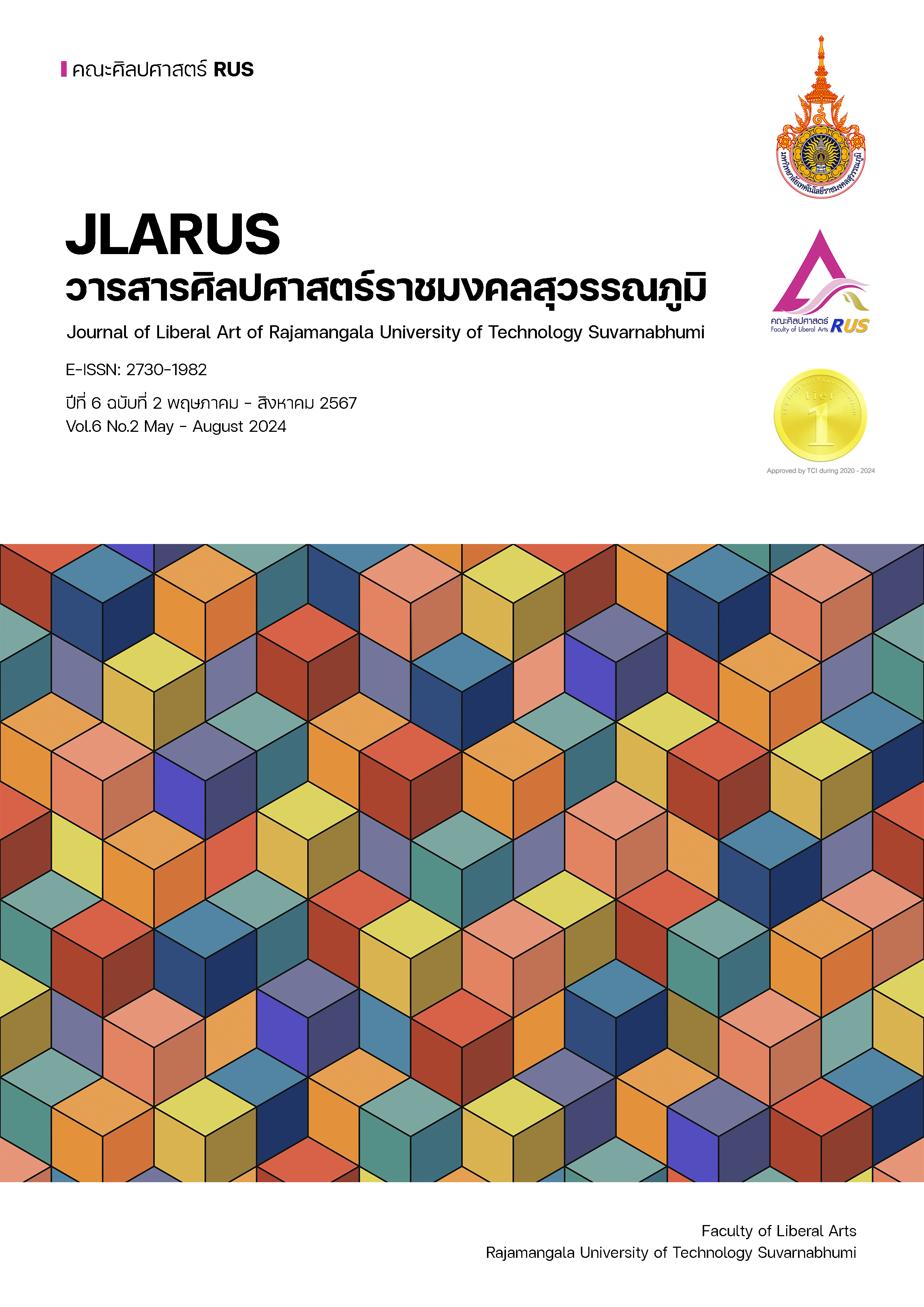THE EDUCATIONAL PATHWAY POST-COVID-19: A COMPARISON OF ACADEMIC PERFORMANCE BETWEEN TRADITIONAL AND ONLINE CLASSROOMS FOR SERVICE INDUSTRY STUDENTS
Main Article Content
Abstract
This research focuses on studying the behaviors and impacts of the pandemic on the learning outcomes of students in the service industry faculty following the effects of the COVID-19 situation and comparing the academic achievements between behaviors in normal classroom learning and online learning outside the classroom. This quantitative study utilized a questionnaire as a research tool, targeting 462 students from the Faculty of Service Industry at Kasetsart University, Kamphaeng Saen campus. The data were analyzed by using descriptive statistics and Analysis of Covariance (ANCOVA).
The findings revealed that the learning behavior of students in the service industry faculty was significantly high (average score of 3.98), and the impact of the COVID-19 pandemic on their learning was also considered substantial (average score of 4.01). There was a statistically significant difference at the 0.05 level in academic achievements between normal classroom learning behaviors and online learning outside the classroom. The results indicated that students were highly motivated in their studies and exhibited positive learning behaviors. The presence of both types of learning behaviors significantly influenced on the academic achievements of students differently. From these findings, it became the evident that understanding the behaviors and impacts of learning during the COVID-19 pandemic on students was crucial. This understanding will be beneficial for the further development of more effective teaching and learning systems. The adaptive challenges presented by the pandemic have necessitated an urgent reevaluation of educational strategies to ensure continuity and effectiveness in learning. The transition to online learning, while challenging, has also opened avenues for innovation in pedagogical approaches and technology integration.
Article Details

This work is licensed under a Creative Commons Attribution-NonCommercial-NoDerivatives 4.0 International License.
References
อรพินท์ ชูชม, ไตรรงค์ ฉายะจินดาวงศ์, & กัญญาภัค เงาศิริฤทธิ์กุล. (2563). พฤติกรรมและเจตคติต่อ การเรียนรู้ที่ส่งผลต่อผลสัมฤทธิ์ทางการเรียนของนักศึกษาระดับปริญญาตรี มหาวิทยาลัย เทคโนโลยีราชมงคลตะวันออก วิทยาเขตบางพระ. วารสารวิชาการ มหาวิทยาลัยตะวันออก, 11(2), 326-334.
Ali, W. (2020). Online and remote learning in higher education institutes: A necessity in light of COVID-19 pandemic. Higher Education Studies, 10(3), 16-25.
Brown, T., & Smith, S. (2021). Supporting mental health and well-being for students during the COVID-19 pandemic. Education and Health Journal.
Cao, W., Fang, Z., Hou, G., Han, M., Xu, X., Dong, J., & Zheng, J. (2020). The psychological impact of the COVID-19 epidemic on college students in China. Psychiatry Research, 287, Article 112934.
Dhawan, S. (2020). Online learning: A panacea in the time of COVID-19 crisis. Journal of Educational Technology Systems, 49(1), 5-22.
Department of Mental Health, Thailand. (2020). The psychological impact of COVID-19 on students in higher education.
Dhawan, S. (2020). Online learning: A panacea in the time of COVID-19 crisis. Journal of Educational Technology Systems, 49(1), 5-22.
Jenasantikul, N. (2021). Online classroom management in response to the transition from face-to-face classes due to the COVID-19 epidemic. Veridian E-Journal, 14(1), 1-13.
Johnson, N. (2021). Adapting higher education during a pandemic: A case study of Thai universities.
Lee, A. (2020). Innovative education in a time of crisis: A rapid response to the COVID-19 pandemic. Journal of Innovation in Education.
Ministry of Public Health, Thailand. (2020). COVID-19 outbreak and its impact on Thai education system.
Mukhtar, K., Javed, K., Arooj, M., & Sethi, A. (2020). Advantages, limitations and recommendations for online learning during COVID-19 pandemic era. Pakistan Journal of Medical Sciences, 36(COVID19-S4), S27-S31.
Smith, J., & Denson, L. (2020). Social and psychological impacts of COVID-19 on higher education students. Journal of Social Sciences.
Sunshine, et al. (2021). Factors affecting students' academic performance: A case study of Sohar University. Psychology and Education, 58(5), 4624-4635.
Toquero, C. M. (2020). Challenges and opportunities for higher education amid the COVID-19 pandemic: The Philippine context. Pedagogical Research, 5(4), Article em0063. https://doi.org/10.29333/pr/7947 Retrieved May 13, 2023.
UNESCO. (2020). COVID-19 impact on education. Retrieved May 13, 2023, from https://en.unesco.org/covid19/educationresponse.
UNESCO. (2020). COVID-19 educational disruption and response.
World Health Organization. (2020). COVID-19 Public Health Emergency of International Concern (PHEIC) Global research and innovation forum.
Xie, Y., & Hu, J. (2020). Factors affecting academic performance of college students in China during COVID-19 pandemic: A cross-sectional analysis. Frontiers in Education.
Yigermal, M.E. (2020). Determinants of good academic performance among university students in Ethiopia: A cross-sectional study. BMC Medical Education.


